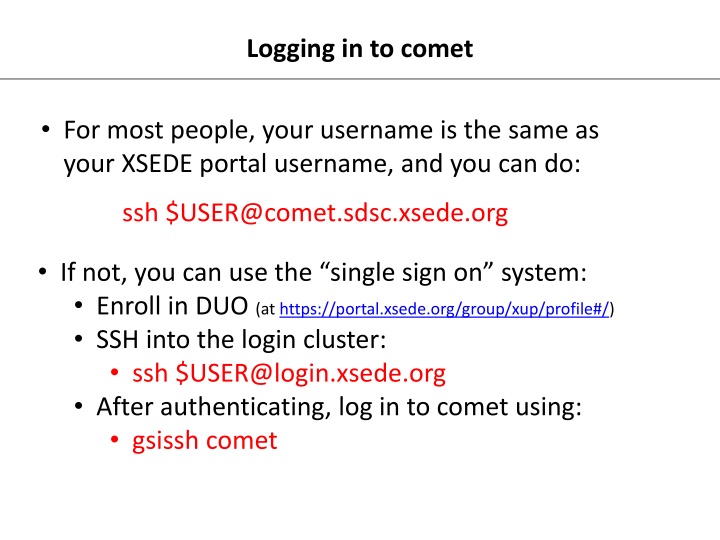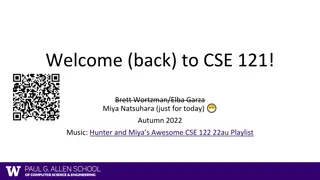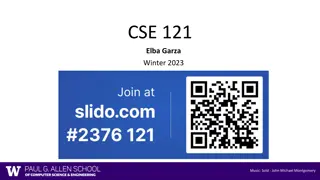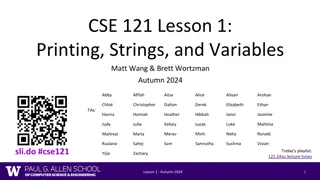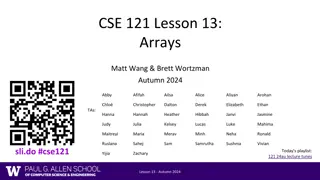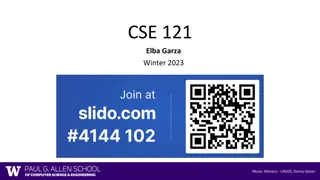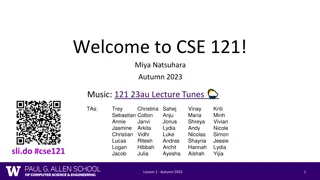CSE 121 Summer 2023 Music Playlist & Programming Assignments Update
Programming Assignment reminders, quiz dates, and final exam details for CSE 121 with Kai Daniels in Summer 2023. Learn about arrays, file I/O, reference semantics, and more. Get ready for a take-home final and upcoming deadlines. Also, enjoy some K-pop in the girlies playlist!
Download Presentation

Please find below an Image/Link to download the presentation.
The content on the website is provided AS IS for your information and personal use only. It may not be sold, licensed, or shared on other websites without obtaining consent from the author.If you encounter any issues during the download, it is possible that the publisher has removed the file from their server.
You are allowed to download the files provided on this website for personal or commercial use, subject to the condition that they are used lawfully. All files are the property of their respective owners.
The content on the website is provided AS IS for your information and personal use only. It may not be sold, licensed, or shared on other websites without obtaining consent from the author.
E N D
Presentation Transcript
Logging in to comet For most people, your username is the same as your XSEDE portal username, and you can do: ssh $USER@comet.sdsc.xsede.org If not, you can use the single sign on system: Enroll in DUO (at https://portal.xsede.org/group/xup/profile#/) SSH into the login cluster: ssh $USER@login.xsede.org After authenticating, log in to comet using: gsissh comet
Account info Our account for the class is csd524 You should see this account when you type: show_accounts Your working directory for the account is at: /oasis/projects/nsf/csd524/$USER This is the same account we will charge jobs to (see slide 4).
Loading modules Many common tools can be loaded as modules . To see all available modules, type: module avail To load a specific module, type e.g. : module load plink/1.9 If you use a certain module all the time, add the module load line to the file: ~/.bash_profile Commonly used modules for this course are loaded by: /oasis/projects/nsf/csd524/mgymrek/utils/load _modules.sh
Running jobs Comet uses slurm to manage jobs in the cluster To run a job using slurm, you can add parameters to a script file, e.g. myscript.sh: #!/bin/bash #SBATCH -A csd524 #SBATCH -p compute #SBATCH -t 10 #SBATCH --get-user-env Command1 Command2 Then run the script using: sbatch myscript.sh
Running jobs continued To see running jobs: squeue u $USER To cancel a running job: scancel <jobid> Many many more options, e.g. you can control: Memory requirement Time limit Where to write log files Job dependencies Do sbatch --help to see options. You will likely not need to change slurm parameters for the problem sets, but will for the final project.
Alternatively You can also just download the data files to your laptop But that defeats part of the goal of learning how to compute in a cluster environment And all of the tools you ll need are already installed on comet
